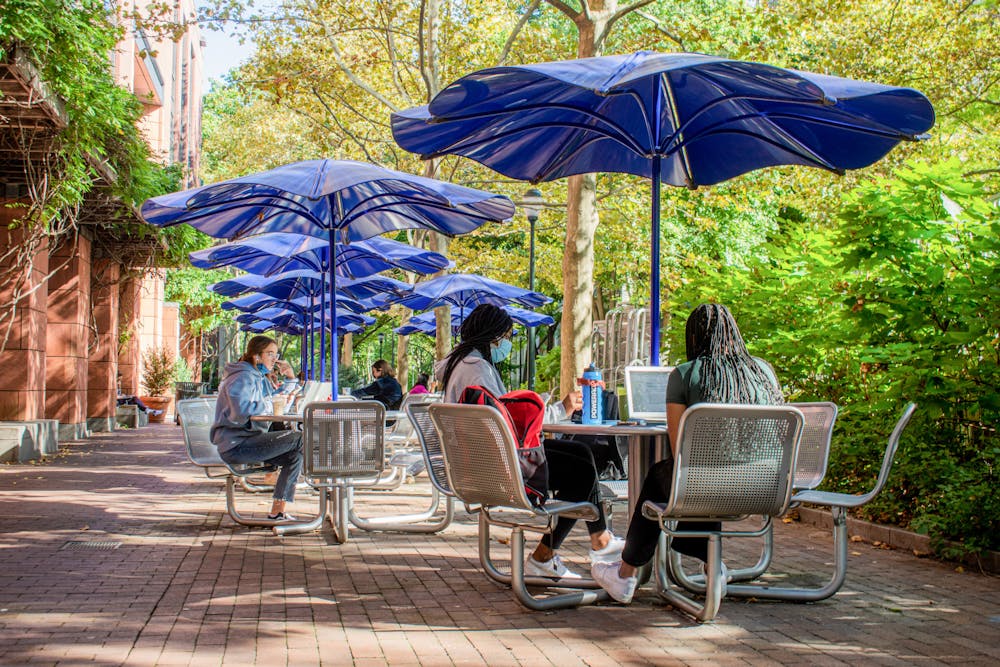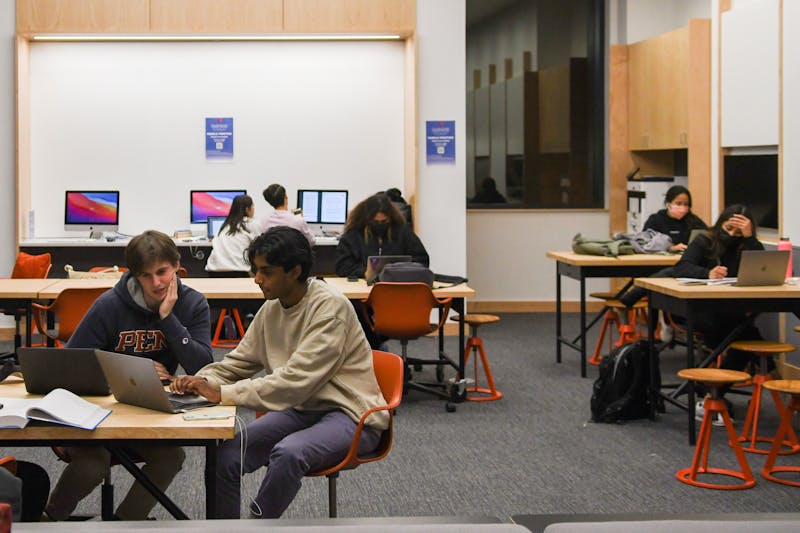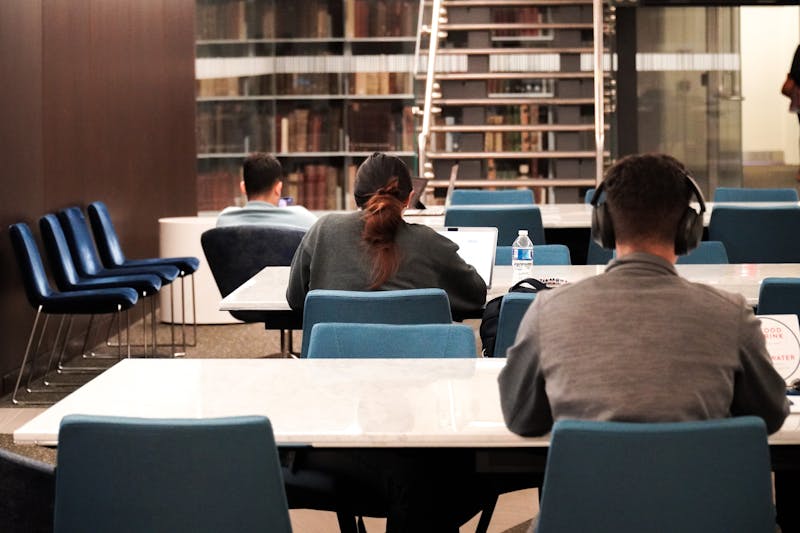
Under Title I of the Americans with Disabilities Act (ADA), in the United States you have the right to reasonable accommodations or modifications to a job, including working conditions and hiring procedures. This is not a matter of special treatment, but to bolster inclusivity and enhance productivity crucial in the workplace and society.
At Penn, exam accommodations reduce barriers for students with disabilities to perform at their highest capacity academically, leveling the educational playing field. Although disabilities are wide-ranging and exist along a spectrum, making them difficult to discern and quantify, they are just as significant as more discernible disabilities in hindering individuals’ functioning capacities beyond their control.
This is precisely why accommodations are intentionally designed and implemented — to generate optimal learning conditions that support the well-being and long-term success of students.
Removing accommodations, as advocated for in this column, negates the struggles of students with disabilities. It also maintains the lie of meritocratic need to punish those with disabilities, perpetuating the ableist narrative that they are less-than just because they require modifications in achieving their goals. Without offering spaces for adjustments, there is no room for students with disabilities to flourish or feel a sense of belonging. Instead, they are outcast. They no longer have anywhere to turn to in seeking assistance for tackling hindrances outside of their control.
As Weingarten discloses on its website, accommodations are mandated by the federal government and in adhering to the Rehabilitation Act and ADAAA accommodations are only eligible to those whose “disability substantially limits a major life activity.”
Weingarten’s requirements for granting accommodations are not “fairly simple.” To start, students must provide and receive a laundry list of documents from professionals, which requires time meeting with providers.
“Students with accommodations with Weingarten have to fill out extensive paperwork, usually accompanied with incredibly costly psychological assessments or doctor’s appointments. It can take months to receive a response, or an approval, as was the case with me,” Wharton student Alejandra said.
I interviewed two individuals who receive accommodations. This column uses pseudonyms, because both women requested anonymity due to the adverse perceptions surrounding disabilities.
Juliet described her experience with the psychoeducational exam to me. In the process, she discovered the economical burden of this exam. She was told that exams conducted in a private practice are a minimum of $2,000, which insurance doesn’t cover 90% of the time. For exams conducted in public clinics, she was informed of a minimum payment of $1,000, with the additional stipulation that insurance was not accepted.
“Due to this, most students opt for a public clinic, but appointments are in high demand,” Juliet explained. “Before getting an appointment, I had to call 10 different clinics and joined numerous waitlists before getting an exam. The exam was six full hours of non-stop testing except for a 30 minute lunch break — I also had to miss class to do the exam as this was the only appointment available.”
I learned from these interviews that not only do students need to jump through hoops to obtain accommodations, they also need to renew them every semester. And when granted accommodations, students must meticulously plan accordingly, requesting them for each exam a week in advance.
Katie told me that she has struggled with missing content in her other classes because they conflicted with the time slots available for her to receive her accommodations. But “the bigger issue was the fact that my professor was not willing to let me take the exam at an alternative time that worked with my class schedule, unless I forfeited my accommodation for a distraction-reduced environment,” she said. “Without proper protocol, professors can put students in really difficult, anxiety inducing situations where they are forced to sacrifice their accommodations to make the professor happy.”
In one particular instance, she told the professor she would be absent because she could only receive her accommodations for a different course during that allotted time, to which the professor responded begrudgingly that she could “make an exception.”
Accommodations are not exceptions, they are needs. Her professor’s response is reflective of the necessity of implementing outlined procedures for professors to turn to when addressing such situations for students with accommodations. It should not be such a stress-inducing endeavor to receive the extra time she needs and deserves. And it should not be solely on the student to navigate such conflicts without guidance.
In another instance, because of an error on the side of the disability service’s testing portal, Katie was not able to schedule her quiz in advance and was consequently forced to take it in a lab while other students were talking and working, disadvantaging her further. This is not a setting conducive for concentration for anyone. Ultimately, due to the disabilities office’s negligence to her initial concerns, a subsequent rude email from them denying assistance in scheduling her quiz, and the professor’s insensitivity toward her legitimate requirements, she dropped the class.
Some argue that these accommodations disproportionately influence standards for GPA, only ill-prepare students for the future in the workplace, and actually give those who receive accommodations a leg up on their peers. There is no leg up where there is no leg to lift to begin with. The purpose is to promote an atmosphere that approaches equal footing.
Students receiving accommodations do not pose unequal standards for GPA. Rather, they allow equal opportunity for these students to obtain the highest GPA possible — parallel to any other student — while living with the impediments of their disability. Additionally, students with disabilities have immense, unique strengths despite their challenges. They know themselves well enough to know what professions would work best for them and provide them the most fulfillment. In regards to workplace policies, the Equal Employment Opportunity Commission outlaws discrimination against disabilities in employment, including mental health conditions.
And when applying for jobs or internships, there are options to let the company know if you have a disability and you will receive accommodations accordingly. Our world is changing to not only accommodate neurodivergency, but also to enhance the experiences of those who are struggling with them. Accommodations are mandated into law to protect these individuals from disproportionate suffering; their contributions to society cannot be overlooked or overstated. Accommodations do not set students back in preparation for their careers, and timed exams are not reflective of real world situations to begin with. Time pressures may be applicable in the workplace, but accommodations are by law intended to assist employees in their efficiency.
It is also a devaluation to claim that those with disabilities are “50% efficient” compared to neurotypical individuals, diminishing their many accomplishments For instance, the quarterback of the New York Jets Zach Wilson and actress and director Greta Gerwig both have ADHD, yet they are not 50% less functioning than others. In actuality, their neurodivergency contributes to their unique skill sets.
Additionally, it is a logical fallacy to state that if a student receives extra time, this extra time will change their knowledge required for the exam. Knowledge does not magically fall into students' laps with extra time. Students with a neuro-processing disorder require more time to match that of those who process at normal speeds. Some may argue extra time provides more time for critical thinking and analysis, but this only applies to those with normal processing speeds to begin with.
And those with accommodations are actually at a disadvantage in the sense that they are not able to ask clarifying questions during exams as their professors are not in the room; if they do want to reach their professors, they may be able to have the proctor email the professor, but prompt response is not guaranteed.
Expecting students to transition away from accommodations by “studying harder” or “asking for help outside of class” entirely dismisses their purpose. Those with accommodations do not need them because of poor studying habits or reluctance to seek help. In actuality, these students are proactive in seeking the help they need outside of class to alter their educational outcomes for the better.
Rather than removing accommodations, Penn should implement clear protocols for professors to turn to. Students with disabilities deserve education catering to their individualized needs with holistic approaches. Universities are centers for learning; students with disabilities warrant environments where they can thrive and benefit from this learning experience in collaborative efforts, just like any of their peers.
Alejandra explains, “When we host conversations on intersectionality and equity, it’s crucial to make sure our definitions of this are all-encompassing. Students should not feel pressured to forgo accommodations. Equity is about making sure all individuals have access to the necessary resources they need to thrive and succeed. As an individual who receives time-based accommodations, the article was incredibly invalidating.”
Schools are legally obligated to ensure that students living with disabilities receive necessary support to participate at their highest level just like their peers. Tailoring support to specific needs ensures students are capable of combating their challenges and receiving the space for their strengths to flourish.
Providing additional support is not about creating an imbalance but about enabling equal access, meeting students where they are, and allowing them to self-actualize. This can only occur by lessening obstacles for students. Any other approach is discriminatory and inflicts greater harm.
RIANE LUMER is a College senior studying political science and journalistic writing from Huntingdon Valley, Pa. Her email address is rlumer@sas.upenn.edu.
Editor’s Note: This op-ed has been updated to include a different image from the image it was originally posted with, as the subjects in the original image were not told that the image was subject to re-use. This op-ed has also been updated to omit information on one of the interviewed students. The DP regrets the error.
The Daily Pennsylvanian is an independent, student-run newspaper. Please consider making a donation to support the coverage that shapes the University. Your generosity ensures a future of strong journalism at Penn.
Donate











